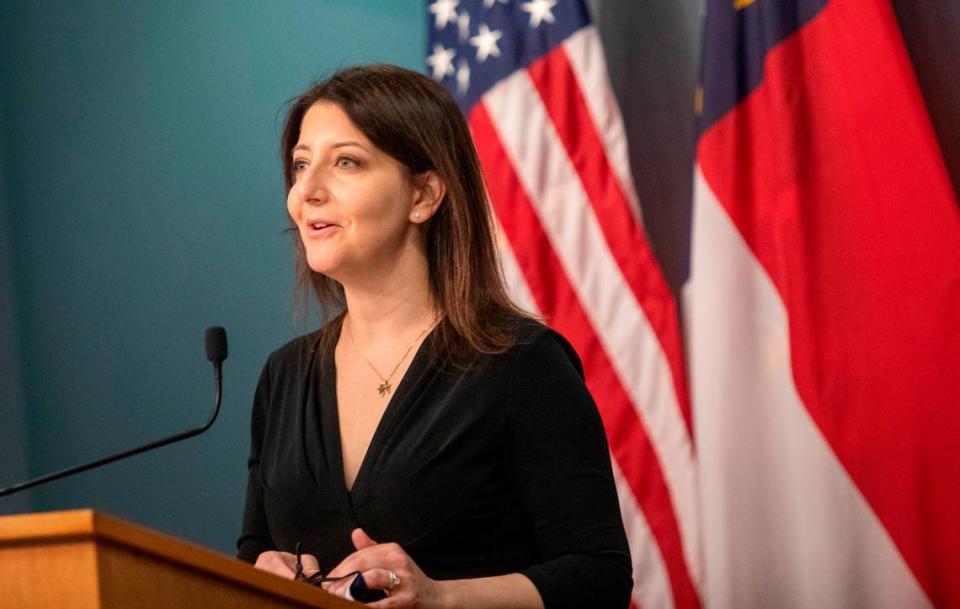Dean’s List: Duke no longer assigning scores to admissions essays. Why the change?
Colleges around the country are grappling with changes to their admissions processes, from weighing whether to reinstate standardized test requirements to assessing the consequences that generative artificial intelligence — like ChatGPT — have on students’ applications.
To confront those issues, Duke University is no longer scoring applicants’ essays or standardized test scores in its admissions process.
The Chronicle, Duke’s student newspaper, reported last week that the university made the changes this year due to “a rise in the use of generative artificial intelligence and college admissions consultants.”
That doesn’t mean students’ essays and their standardized test scores — if applicants choose to submit them under Duke’s current test-optional application policy — aren’t considered in the admissions process, though.
Welcome to Dean’s List, a weekly roundup of higher education news in the Triangle and across North Carolina from The News & Observer and myself, Korie Dean.
This week’s news includes more on the changes Duke is making to how it evaluates students’ applications, how many North Carolina student loan borrowers will be impacted by the Biden administration’s latest relief efforts, a familiar face being tapped to speak to Wake Forest University graduates in May and more.
Let’s get started.
Duke will no longer score essays, standardized tests
Previously, Duke’s admissions office assigned numerical scores to six areas of a student’s application, The Chronicle reported: the strength of a student’s curriculum, plus their grades, extracurricular involvement, letters of recommendation, essays and test scores.
With the changes made this year, essays and test scores no longer receive numerical value in the process, though the remaining four areas are still scored, The Chronicle reported.
Test scores are still considered in the process if an applicant submits them, and essays are used to help admissions officers better understand applicants holistically, Dean of Undergraduate Admissions Christoph Guttentag told The Chronicle.
In a statement provided to The N&O, Guttentag called numerical ratings for essays “an artifact of the past,” noting they were used “when we thought they were an accurate reflection of the applicant’s writing ability.”
“Not giving a numerical score in this area gives us more opportunity to treat the essay in a holistic context. We use the essays to learn about the applicant as a person with a unique story, and to consider how they and we might benefit from their joining our Duke community,” Guttentag told The N&O. “Our focus is on what we learn about the student from the essay, rather than determining what or who may have influenced the style of the essay.”
The rise of generative AI has led to concerns over students using the technology to craft and write essays for them, whether for homework assignments or college applications. Guttentag told The Chronicle that “there aren’t simple answers” to questions about how Duke might determine if an applicant used generative AI to write their essay, nor whether applicants are “hurt,” or disadvantaged somehow, in the admissions process if such a determination is made.
Students applying to Duke do have to attest, upon submitting their application, that their “application materials were not created by another person or by a generative artificial intelligence system.” (You can read more about that requirement, and similar requirements at universities across the state, in a report on the impacts of AI on application essays from myself and my N&O colleague Brian Gordon, published last fall.)

Though the changes came on the heels of the U.S. Supreme Court overturning the consideration of race in admissions — a ruling that left space for students to discuss race to some degree in their essays — the court’s decision was not a factor in Duke’s decision regarding essays, Guttentag told The Chronicle.
On a related note: The UNC System Board of Governors on Wednesday will review a policy recommendation that would reinstate standardized test requirements for some applicants beginning in the next admissions cycle. Read more on that proposal in my story here.
4,000+ NC borrowers to have student loans forgiven
Nearly 153,000 student loan borrowers across the country received an email last week from President Joe Biden, informing them that their remaining debt will be canceled. The move will result in a total of $1.2 billion of loan debt being forgiven.
Of those borrowers, 4,170 were from North Carolina, according to a state-by-state breakdown from the president’s administration. Those borrowers will have a total of $33.3 million in loan debt forgiven, the announcement said.
To be eligible for the loan forgiveness, borrowers had to be enrolled in the Saving on a Valuable Education (SAVE) Plan, a new income-driven repayment plan that launched last fall as the pandemic-era pause on loan repayments ended. They also had to have made at least 10 years of payments and to have originally taken out $12,000 or less in loans for college. For every $1,000 borrowed above $12,000, a borrower can receive forgiveness after an additional year of payments.
Mandy Cohen to address Wake Forest grads
We’re just a few months away from college seniors across the state turning their tassels and becoming alumni of their universities.
Wake Forest University announced last week that a familiar face will address graduates at the university’s May 20 ceremony. Mandy Cohen, who led North Carolina’s COVID-19 response as secretary of the state Department of Health and Human Services and is now the director of the Centers for Disease Control and Prevention, has been tapped for the job.
“As a physician and leader, Dr. Cohen has dedicated her career to improving health and wellbeing in North Carolina and nationwide,’ Wake Forest President Susan Wente said in an announcement.
Cohen’s selection is the result of a revamped process to select the university’s commencement speaker. A committee of faculty, staff and students is delegated to “nominate a prioritized slate of potential guest speakers to submit to Wente.”
The committee solicits nominations of potential speakers who embody and reflect the following:
Appreciate the pursuit of excellence in the liberal arts and in graduate and professional education;
Advance the frontiers of knowledge through in-depth study, research, practice;
Demonstrate creativity, imagination and innovation in the service of humanity;
Encourage habits of mind that ask “why,” that evaluate evidence, that are open to new ideas, and open and frank dialogue;
Understand and appreciate inclusion and diversity;
Model ethical leadership;
Represent national/international stature in their profession.

ECU research to support young cancer survivors’ mental health
A three-year, $750,000 grant from the National Cancer Institute (NCI) will support an East Carolina University professor’s development of a “digital self-management tool” for adolescent and young adult cancer survivors experiencing depression.
“Individuals diagnosed with cancer between the ages of 15 and 39 constitute a medically underserved group identified by the NCI,” ECU assistant psychology professor and principal investigator Karly Murphy said in a news release. “Unfortunately, this demographic faces disproportionately high rates of depression, which often goes undiagnosed and untreated.”
Murphy is leading a team of collaborators at ECU and Wake Forest who are finalizing the content of the tool, the release said. They plan to recruit for a trial of the tool later this year.
Murphy envisions the tool becoming part of routine care for the affected population of cancer survivors, allowing care providers to provide the resource upon patients reporting symptoms of depression.
Higher ed news I’m reading
An Idaho bill would require public colleges to close diversity, equity and inclusion offices, and it lists three dozen examples of jobs at some schools that would be prohibited if it passes, The Chronicle of Higher Education reports.
As federal health officials investigate whether employees’ exposure to hazardous materials at NC State University and UNC-Chapel Hill could have caused cancer, N&O reporter Adam Wagner explains what it takes for a cancer cluster to be declared — and why it’s difficult to do so.
Sign up for our higher education newsletter
That’s all for this week’s roundup of North Carolina higher education news. I hope you’ll stay tuned for more.
Like what you read here and want to be on our mailing list when the Dean’s List newsletter launches? Have suggestions for what kind of content you’d like to see featured in the future? Let us know by filling out the form below:

